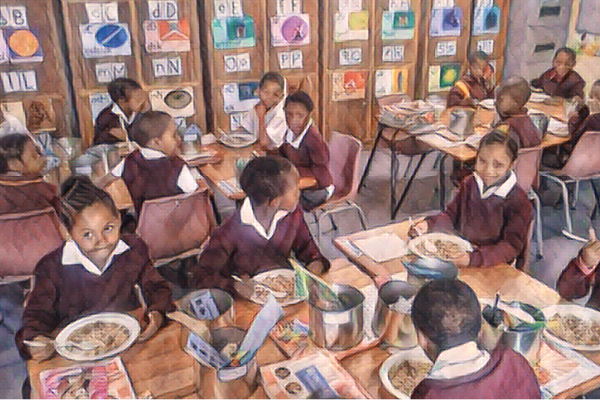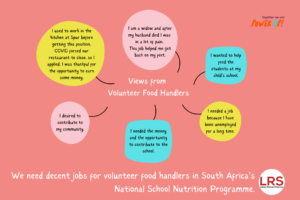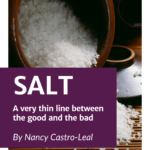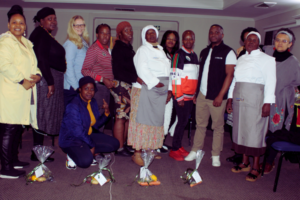How the NSNP works
The National School Nutrition Programme was launched in 1994 as one of Mandela’s lead projects. The NSNP provides healthy nutrition that supports children’s ability to learn. More than 9.6 million children in South Africa depend on the NSNP. In 2020, learners at 21 000 schools had nutritious meals prepared through the NSNP.
The NSNP targets children in no-fee paying primary and high schools i.e. quintiles 1-3. If resources are available targeted learners in quintiles 4 and 5 are also catered for. There are 3 components to the program:
- School feeding schemes aimed at providing daily nutritious meals to learners
- Nutrition education for promoting healthy lifestyles
- School Food Gardens where learners, educators and parents are provided with skills to grow their food as a way of contributing toward long-term household food security. The gardens are used as a teaching and learning resource.
The Department of Basic Education is responsible for coordinating the NSNP in cooperation with the Provincial Education Departments. Provincial Education Departments provide the Department of Basic Education with a proposed budget which includes food, stipends for the Volunteer Food handlers, equipment and cooking fuel. Provinces are also responsible for promoting local economic empowerment through the procurement of fresh produce from smallholder farmers. The farmers should be registered with the Department of Agriculture, Land Reform and Rural Development and adhere to good agricultural practices. Between 2018 and 2019, 3 477 small and medium enterprises and local cooperatives were contracted to supply food to learners
The NSNP is funded through a Conditional Grant that is transferred to provinces. The budget for 2022/23 stands at R8.5 billion. All levels of Government have the responsibility of ensuring the smooth running of the NSNP. The National Department of Education is responsible for ensuring that funds are secured from National Treasury. The Provincial Departments of Education are responsible for developing and submitting business plans to the Department of Education and the Districts are responsible for supporting and monitoring the NSNP at the school level. Schools that form part of the NSNP are required to set up School Nutrition Committees responsible for proper menus, health and safety and monitoring and evaluation. The committee comprises nutrition advisers, School Governing Body members, a school coordinator and a volunteer food handler.
The Volunteer Food Handler – Keeping the NSNP alive in the School
The NSNP is operational in over 21 000 schools and at the heart of the programme is a huge workforce of more than 61 000 volunteer food handlers who start early in the morning with food preparation, serving the children breakfast and lunch and then cleaning the kitchen and utensils.
Unemployed parents of learners in local communities, mostly women, are recruited and appointed by the School Governing Body (SGB) as volunteer food handlers. Volunteer Food Handlers are unemployed parents of learners in local communities, usually women who are recruited on a contract basis and receive a monthly stipend of anything between R1360 and R1566 depending on provincial budgets. The food handlers are entitled to a small Unemployment Insurance Fund benefit. One volunteer food handler is appointed for every 200 learners. Large schools have up to eight food handlers. In small schools, the ratio of food handlers to learners can be 1:125.
The conditions of the volunteer food handlers are often very challenging where they are obliged to work on average six hours of hard labour, and in some cases in tough conditions, with no running water or even a proper kitchen. Sometimes before cleaning utensils, volunteer food handlers have to move all around the school collecting dishes left by learners after eating. Volunteer food handlers earn much less than workers in the Expanded Public Works Programme (EPWP). For instance, a general EPWP worker in Gauteng earns an average of R3 795. Volunteer food handlers should be applauded for their commitment and dedication to the nutritional and educational well-being of children from schools across many impoverished communities.
Why it is necessary to support the NSNP and the work of the Volunteer Food Handlers
All over the world school nutrition programmes like the NSNP are acknowledged as having a positive impact on the nutritional status of children.
For many children, the meal they receive at school is the only full nutritious meal they will receive for the day and this is very important, particularly for the child who might come to school hungry. It is very hard to concentrate or actively participate in learning if you are hungry. Receiving a nutritious meal is essential for enhancing learning and the overall development of the child.
The NSNP’s promotion of school food gardens helps learners gain knowledge about healthy food production. The World Health Organization emphasizes the benefits of school gardens as a means to improve childhood health and nutrition and as an important means of creating food security where children can have access to sufficient, safe, and nutritious food. Having the gardens fun and exciting to work in can encourage learners to eat what they produce and in this way extend their diets to a bigger variety of fresh vegetables and fruit. The school food gardens offer educators, learners and community members the opportunity to grow local vegetables and to include these in the meals at school. In some schools, the produce of the school food garden is shared with the broader community where for example on Fridays some learners are given food parcels to assist both the learner and their family members with food over the weekend.
“The work in school food gardens should become part of the school curriculum.”
While we have no evidence as yet of the work of school gardens becoming part of the core curriculum or extracurricular activities at school, the gardens do offer learners the opportunity to increase their more formal knowledge about agricultural production. The work in school food gardens should become part of the school curriculum.
The benefits of the NSNP go beyond feeding learners at school, and can also boost the local economy by offering opportunities for generating job opportunities or market opportunities for small-scale farmers. The mostly unemployed women recruited as volunteer food handlers have the chance to learn new skills and earn a very small stipend. The success of the NSNP rests at the moment on the shoulders of the more than 61 000 volunteer food handlers. The work of feeding millions of children must be seen as work deserving of recognition. While the position of volunteer food handler offers some possibility of a form of employment, for it to be a real job, the food handler needs to be valued and rewarded accordingly. We need decent jobs for volunteer food handlers.
“The work of feeding millions of children must be seen as work deserving of recognition, value and appropriate salary and conditions at work.”
At present, it is very difficult to know how the NSNP has opened up possibilities for procurement from small-scale local farmers. To ensure that the NSNP does become a vehicle for promoting the local economy, relevant stakeholders need to be aware and involved in decisions around procurement.
*Get the PDF version of this article.
_____
REFERENCES :
No. 43495 GOVERNMENT GAZETTE, 3 JULY 2020: Frameworks for Conditional Grants to Provinces.
Articles Published in the Family & Consumer Sciences Research Journal in 2019. (2020). Family and Consumer Sciences Research Journal, 48(3), pp.298–301. doi:10.1111/fcsr.12354. Available here.
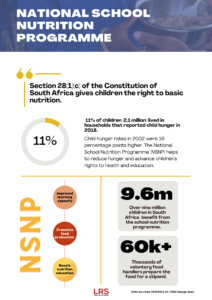
A day in the life of Volunteer Food Handler
Experience a day in the life of Khuli Gumede, a Volunteer Food Handler (VFH) with the National School Nutrition Programme (NSNP), as she goes about her daily routine. Khuli is one of more than 60,000 Volunteer Food Handlers who prepare and serve meals to learners in the programme. As we delve into Khuli’s journey, we uncover the realities faced by Volunteer Food Handlers. These remarkable individuals, predominantly women and mothers of the children in the schools they serve, have multifaceted lives beyond their role. Despite their significant contributions, they are often unseen, undervalued and unpaid as workers.
Power Up Nutrition Series
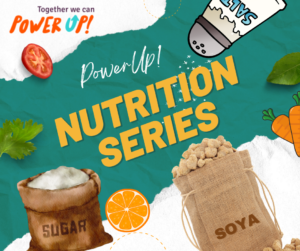
Ebook 1: Sugar – A sweet poison
Ebook 2: Protein – The pillar of life

Jabula song
Co-created with a core group of Volunteer Food Handlers, ‘Jabula’ song is an advocacy tool in our campaign for the recognition and valuing of the work of Volunteer Food Handlers.
In this video, we show the stark realities of Elizabeth and Lehlohonolo, two working-class people who face an extraordinary challenge – accessing their Unemployment Insurance Fund (UIF) benefits. Their stories highlight the devastating impact of the informalisation of work on women workers, particularly accessing social protection.

